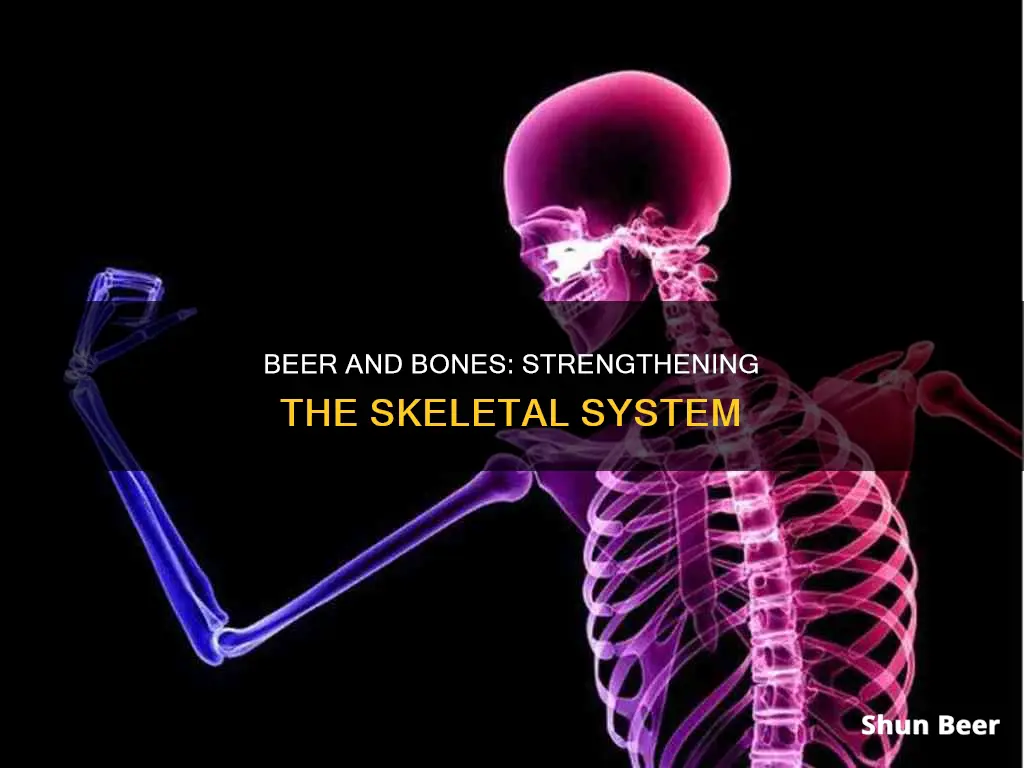
Beer has been claimed to help prevent osteoporosis and strengthen bones, but does it? Beer is a significant source of silicon, which is believed to be a key ingredient in improving bone mineral density and preventing bone thinning. However, the relationship between alcohol consumption and bone health is complex and not fully understood. While some studies suggest that moderate drinking may have beneficial effects on bone health, others indicate that even small quantities of alcohol can have detrimental effects on the skeleton. The type of alcoholic beverage may also play a role, with beer and wine showing more positive associations with bone density than distilled liquors.
So, while certain types of beer may provide some benefits for bone health, it is important to consider the potential risks associated with alcohol consumption. Heavy drinking is known to increase the risk of osteoporosis, and excessive alcohol intake can negatively impact nutrient absorption, hormone levels, and bone-building cells. Therefore, it is crucial to consume alcohol in moderation and prioritize a well-balanced diet and healthy lifestyle to maintain strong bones.
| Characteristics | Values |
|---|---|
| Can drinking beer make your bones stronger? | It depends. |
| Types of beer that can make your bones stronger | Blonde beer, light-coloured beer, pale malted ales and lagers |
| Types of beer that won't make your bones stronger | Dark bitters, stouts, wheat beers |
| Quantity of beer that can make your bones stronger | 1-2 drinks/day |
| Quantity of beer that won't make your bones stronger | More than 2 drinks/day |
| Beer's bone-strengthening properties | Beer is a significant source of silicon, which is a key ingredient that helps to improve bone mineral density. |
| Other factors to consider | Age, gender, duration of drinking, diet, exercise, etc. |
What You'll Learn

Beer is a source of dietary silicon, which may be important for bone health
Beer is a rich source of dietary silicon, which may be important for bone health. Silicon is a key ingredient that helps to improve bone mineral density. The National Institute of Health in the United States says silicon may be important for the growth and development of bones, and beer "appears to be a major contributor" to the amount of silicon in the diet.
The California University in Davis discovered that beer is an important source of silicon, a mineral that has been associated with bone health. The researchers analysed 100 different beers from several countries and found that beer contains between 6.4 and 56 mg of silicon per litre, with an average of 29 mg per litre. They also found that beer with a light colour has a higher silicon content, while beer with a low alcohol level contains less silicon.
According to the study, beer is a major source of dietary silicon, with roughly half of the silicon in beer being absorbable by the body. The lead author of the study, Dr Charles Bamforth, said that "beers containing high levels of malted barley and hops are richest in silicon". He also noted that wheat contains less silicon than barley because the husk of the barley is rich in this element.
However, it is important to note that while moderate alcohol consumption may have bone density benefits, higher intakes have been shown to decrease bone strength. The National Osteoporosis Society does not recommend increasing alcohol consumption based on these studies, as an alcohol intake of more than two units per day can increase the risk of breaking a bone. Additionally, there are other health concerns linked to alcohol that should not be ignored.
While beer may contribute to bone health through its silicon content, it is not as significant as other nutrients such as calcium and vitamin D, which are essential for bone health and are potentially deficient in the UK diet.
Beer and Blood Donation: Can They Mix?
You may want to see also

Silicon in beer may protect bone mass from osteoporosis
Silicon is a key ingredient in increasing bone mineral density and preventing osteoporosis, a disease of the skeletal system characterised by low bone mass and deterioration of bone tissue. Beer is a significant source of dietary silicon, with an average silicon content of 6.4 to 56.5 mg/L. Beers containing high levels of malted barley and hops, such as blonde beer, are richest in silicon. Silicon is present in beer in the soluble form of orthosilicic acid (OSA), which yields 50% bioavailability. This makes beer a major contributor to silicon intake in the Western diet.
According to the National Institutes of Health (NIH), dietary silicon, as soluble OSA, may be important for the growth and development of bone and connective tissue. Based on these findings, some studies suggest that moderate beer consumption may help fight osteoporosis.
The lead author of a study on silicon in beer, Charles Bamforth, stated that "beers containing high levels of malted barley and hops are richest in silicon". He also noted that "while most of the silicon remains in the husk during brewing, significant quantities of silicon are nonetheless extracted into wort and much of this survives into beer."
However, it is important to note that excessive alcohol consumption can negatively impact bone health. Heavy drinking can cause hormone deficiencies in both men and women, decrease estrogen levels, and affect nutrient absorption, including calcium and vitamin D, which are critical for healthy bone development. Therefore, while silicon in beer may protect bone mass from osteoporosis, it is crucial to consume beer in moderation as part of a healthy lifestyle that includes a well-balanced diet and regular exercise.
Beer's Impact on Protein in Urine: A Surprising Discovery
You may want to see also

Pale beers have more silicon than darker beers
Beer has been found to be a rich source of silicon, which is a key ingredient for increasing bone mineral density. Silicon is present in beer in the soluble form of orthosilicic acid (OSA), which has a 50% bioavailability. This makes beer a major contributor to silicon intake in the Western diet.
The presence of silicon in beer has been linked to its content of malted barley and hops. Researchers from the University of California, Davis, found that beers with high levels of malted barley and hops had the highest silicon content. The study also showed that pale-coloured beers, or blonde beers, had higher silicon content than darker beers. This is because pale beers undergo less heat stress during the malting process, and the majority of the silicon in barley is present in the husk, which is not affected during malting.
The average silicon content of the beers sampled in the study was 29.4 parts per million (ppm). Indian Pale Ales (IPAs) had the highest silicon content, averaging 41.2 ppm, while light lagers averaged 17.2 ppm.
While the researchers do not recommend drinking beer solely to meet your silicon intake needs, their findings suggest that moderate beer consumption may contribute to bone health and help prevent osteoporosis. However, it is important to note that excessive alcohol consumption can negatively impact bone health and increase the risk of osteoporosis.
Beer and Rudraksha: A Spiritual Conundrum?
You may want to see also

Excess alcohol negatively impacts bone health
Firstly, alcohol affects the absorption of vital bone-building nutrients, namely calcium and vitamin D. This impacts the body's ability to build strong bones and increases the risk of fractures. Research has also found that chronic heavy drinking can cause hormone deficiencies in both men and women, which can negatively impact bone density. For example, in men, alcoholism may lead to lower testosterone production, which is linked to reduced bone formation. In women, overconsumption of alcohol can decrease estrogen levels, which can also negatively affect bone density. Estrogen plays a role in inhibiting bone breakdown and may stimulate bone formation, which is why a decrease in estrogen during menopause is associated with bone loss.
Secondly, excessive alcohol consumption increases the risk of falling, which can be dangerous for those with weak bones.
Thirdly, while some studies suggest that beer may be better for bone health due to its high levels of silicon, a mineral that may protect bone mass, other studies have found that wine may offer more protection to bones due to its rich phenolic compounds, phytoestrogens, and natural antioxidants.
Overall, while moderate alcohol consumption may have some benefits for bone health, excessive drinking can lead to negative consequences. It is important to maintain a healthy lifestyle with a well-balanced diet and regular exercise to maintain strong bones and reduce the risk of fractures.
Clear Liquid Diets: Root Beer's Place
You may want to see also

Experts advise against increasing alcohol consumption for bone health
While some studies have suggested that drinking beer can help to prevent osteoporosis, experts advise against increasing alcohol consumption for bone health. Although moderate alcohol consumption has been linked to improved bone density, heavy drinking is associated with an increased risk of osteoporosis.
Osteoporosis is a degenerative disease that weakens bones, increasing the risk of fractures. Alcohol can impact bone density, the speed of bone cell rebuilding, and the absorption of bone-forming nutrients such as calcium and vitamin D. Chronic heavy drinking can cause hormone deficiencies and negatively affect bone-building osteoblast cells, increasing the risk of bone fractures.
While some studies have found a positive association between alcohol intake and bone mineral density, especially in postmenopausal women, the relationship between alcohol consumption and bone health is complex and not yet fully understood. The benefits of alcohol for bone health may depend on various factors, including age, sex, and drinking patterns.
Additionally, the type of alcoholic beverage may also play a role. Beer, for example, has been found to be a source of silicon, a mineral important for bone health. However, the benefits of silicon from beer may be outweighed by the negative effects of excessive alcohol consumption.
Therefore, while moderate drinking may have some benefits for bone health, experts caution against increasing alcohol intake specifically for this purpose. The risks associated with excessive alcohol consumption, including negative effects on bone health, outweigh any potential benefits. It is important to prioritize overall health and well-being when considering alcohol consumption.
Beer and Kidney Health: Long-Term Drinking Effects
You may want to see also







